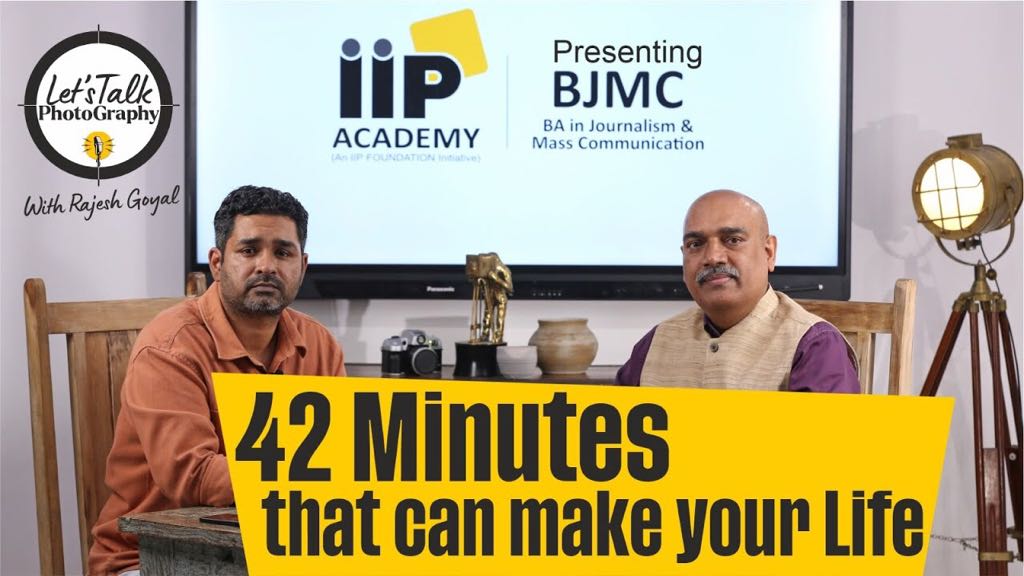Unveiling Bachelors in Journalism and Mass Communication at IIP Academy
Welcome to a transformative conversation between Mr. Rajesh Goyal, the visionary founder of IIP Academy, and Mr. Manish Sehrawat, the Head of the Department pursuing his PhD. In this special podcast episode, we discuss the pressing need for our Bachelor's program in Journalism and Mass Communication (BJMC) in the context of next-generation mass communication education.
BJMC: Shaping Future Storytellers
Explore how journalism can evolve in a world where 'News has become Views.' We dive into our teaching pedagogy, grounded in mentor-mentee discussions, practical learning, and outdoor exposure led by industry experts like Jagadish Yadav, Ashok Shrivastava, Riitu Chugh, Shantanu Gupta, Ashutosh Joshi, Rajesh Goyal, Asif Khan, and guest faculties.
Media's Vital Role in Democracy
Discover why media, as the fourth pillar of democracy in India, holds immense responsibility. Our mission is to cultivate students who champion critical and constructive journalism, endorse a free press, and refrain from making opinions or narratives.
A Curriculum for Success
Learn about our well-structured curriculum that prepares graduates for careers in both conventional and contemporary journalism, advertising agencies, content creation, and artistic expression. We're nurturing great artists, leaders, and thinkers.
Key Features of Our BJMC Program
In the context of next-generation mass communication education, a Bachelor's degree program should be designed to prepare students for the evolving landscape of media and communication. Here are some features that should be considered:
Multidisciplinary Curriculum: Our program includes a wide range of courses that cover not only traditional journalism and communication but also emerging fields such as digital media, data journalism, virtual reality, and social media analytics.
Digital and Technological Proficiency: We equip students with strong digital and technological skills, including content creation, video production, data analysis, and familiarity with the latest communication tools and platforms.
Media Literacy: We emphasize critical thinking and media literacy to help students evaluate and analyze information from various sources, especially in the era of fake news and misinformation.
Ethical Journalism and Responsibility: We instill a strong sense of ethics and responsibility in journalism and communication practices, focusing on accuracy, fairness, and transparency.
Audience Engagement: We teach strategies for engaging with diverse audiences through interactive and multimedia content, audience research, and community-building techniques.
Adaptability and Innovation: We foster adaptability and an innovative mindset, encouraging students to embrace change and explore new storytelling formats and technologies.
Global Perspective: Our program offers a global perspective on mass communication, including international communication, cross-cultural understanding, and the impact of global media on society.
Practical Experience: We provide hands-on experience through internships, fieldwork, and practical projects, allowing students to apply their skills in real-world settings.
Data Journalism and Analytics: We integrate data-driven journalism and analytics into the curriculum to teach students how to gather, analyze, and visualize data for effective storytelling.
Media Ethics and Social Responsibility: We emphasize the role of media in promoting social responsibility and addressing important societal issues, such as social justice, environmental concerns, and human rights.
Course Overview
B.A. MCAJ is a three-year program that creates a vivacious space for newcomers to the field to develop as the storytellers of society. As time and technology are not static and our internet era has brought on the challenges of engaging audiences. So, our newsmaking style is changing.
Interdisciplinary Skills
This course delivers interdisciplinary skills in a range of media practices including Radio (programs, announcements, news); Print media (editorial, feature, interview, data journalism) News package; Development communication; Digital journalism; Print advertising (research, marketing, design, logo, body of work); Mass communication & society (theoretical, critical and research-based); Visual ethnography; Documentary; Photography; and Research in mass communication.
Creative Practice and Innovation
Our unique course combines traditional art school approaches to creative practice-based liberal thought of choices during the learning period and project making, where students develop skills in critical thinking, new choices of expressionism, innovation in decision-making, and contextual awareness with industry–level – professionalism.
Click to Watch the Video https://www.youtube.com/watch?v=8-87XwE54a0




